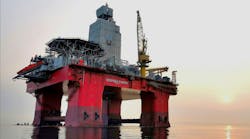By an OGJ correspondent
RIO DE JANEIRO, May 5 -- Halliburton Co.'s construction and engineering division, KBR, is more than 6 months late in delivering two semisubmersible floating production platforms (FPPs) to Petroleo Brasileiro SA (Petrobras), a company source who requested anonymity told OGJ Online.
"The P-43 and P-48 platforms�will have the capacity to process 150,000 b/d of crude each, said Archie Carmichael, KBR site manager in Angra dos Reis, Rio de Janeiro state. P-43 will lie in 815 m of water in Barracuda field and P-48 will lie in 1,035 m of water in Caratinga field in the Campos basin, off Rio de Janeiro state, he added.
The FPPs were contracted for $240 million each. The development of the fields is expected to cost $2.5 billion through project finance, said Petrobras.
The P-43 FPP is under construction by Fels Setal in Angra dos Reis, Rio de Janeiro state, with start up of production expected to have occurred this year.
The P-48 FPP, meanwhile, is being revamped in Singapore at the Jurong shipyard. KBR is responsible for the engineering, contracting, and installation of the two FPPs.
Both Petrobras and KBR in Brazil declined to comment about the dispute while negotiations are going on.
Delay penalties
With the delivery delay, Petrobras will have additional costs of 19% for Brazilian excise tax, according to the so-called Valentim law passed by Rio de Janeiro's state assembly last year.
This law calls for payment of this percentage for platforms built abroad to work off Rio de Janeiro. The law does not take into consideration delays in delivery, however. The tax has to be paid by the company according to the contractual schedule.
A Petrobras source, requesting anonymity, told OGJ that part of the delay was caused by numerous modifications requested by Petrobras in the project. "If an accord is not reached by the two parts, this matter could end up in an international arbitration court," the source said.
